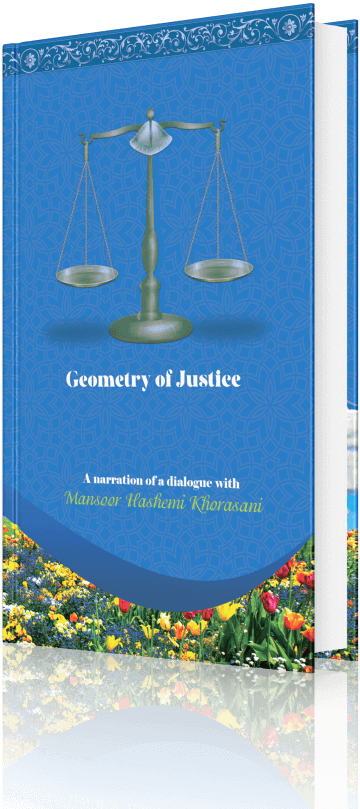In summary, ignorance about Islam is the cause of their deviation, and ignorance about Muslims is the cause of their separation, and ignorance about unbelievers is the cause of the destruction of Muslims, and that is the calamity that has befallen them, and the fitnah that has encompassed them, and the only way to become free of it is gaining knowledge and promoting it in the three aspects. [Return to Islam, p. 48]
One of the common types of “imitation” is following the saying and action of the predecessors; because many people believe that what their predecessors said and did are necessarily more correct than what they say or do; whereas this belief is nothing but an illusion and has no basis in the intellect; because undoubtedly, the correctness of what a person says and does is not subject to the time of his birth, rather to its more conformity with the intellect, which does not correlate with the time priority of the human being’s birth; as there is no dispute about incorrectness of many of sayings and actions of the predecessors, rather God Almighty has deemed most of them have gone astray and perished, and said: ﴿وَلَقَدْ ضَلَّ قَبْلَهُمْ أَكْثَرُ الْأَوَّلِينَ﴾; “And indeed, most of the predecessors went astray before them”, and said: ﴿أَلَمْ نُهْلِكِ الْأَوَّلِينَ﴾; “Did We not made the predecessors perish?!”. [Return to Islam, p. 49]
The belief in the necessity of following the predecessors has no basis in Islam and is one of the polytheists’ beliefs, and it is considered an impediment to cognition because its advocates consider the truth as falsehood if it is contrary to the predecessors’ sayings or actions; considering that, in their opinion, if it was the true, it would not remain hidden from the predecessors, and whatever has remained hidden from the predecessors is bid’ah; as God Almighty has informed of their words and said: ﴿مَا سَمِعْنَا بِهَذَا فِي الْمِلَّةِ الْآخِرَةِ إِنْ هَذَا إِلَّا اخْتِلَاقٌ﴾; “We have not heard that in the previous religion! This is nothing but a fabrication”! [Return to Islam, p. 50]
Following the predecessors, if it is due to them following the intellect, the intellect exists for posterity as well, and with its existence, following the predecessors is meaningless, and if it is due to them following the religion, the religion exists for posterity as well, and with its existence, following it is more deserving than following the predecessors; rather following the predecessors due to them following the intellect and the religion is a contradictory work; because following the predecessors, if they followed the intellect and the religion, entails following the intellect and the religion, not the predecessors; considering that the predecessors, according to the presumption, have followed the intellect and religion, not the predecessors, and therefore, following the predecessors requires not following the predecessors! [Return to Islam, pp. 50 and 51]
Following the first three generations of Muslims has no basis in Islam, nor is it justifiable with any statement, and this is regardless of its impossibility in reality; because the first three generations of Muslims were different individuals and groups with contradictory sayings and actions, to the extent that they considered the sayings and actions of each other to be incorrect and fought over them. It is clear that with this description, it is not possible to follow them; because following the sayings and actions of some of them means not following the sayings and actions of some others, and this is a contradictory and meaningless work. [Return to Islam, pp. 55 and 56]
The helpers of the Mahdi are imbued with the morals of God’s Prophets and trained with the manners of God’s friends; they submit to the truth once it is revealed to them and abandon falsehood once it is exposed to them; they are neither fanatic and stubborn nor foul-mouthed and garrulous; they do not fabricate lies against God and dissociate themselves from those who fabricate lies against Him; they perform prayer at the beginning of its time and donate their belongings to the needy; they restrain their anger and forgive people’s wrongdoings; they cherish their parents and have patience with their bad tempers; they do not disrespect their friends under the pretext of friendship, nor do they wrong their enemies under the pretext of enmity; they tolerate the ignorant and do not quarrel with fools; they do not talk nor laugh nor sleep nor eat too much; they restrain their lust and do not abandon chastity; they are not oglers nor shameless, neither do they show off and talk nonsense; they do not make friends with sinners, nor do they keep company with oppressors; they are occupied with useful works and do not waste their time; they are familiar with the Book of God and know what is permissible and what is forbidden; they do not deny the scholar’s teachings and avoid being hostile to him, but rather they answer his invitation and rush to his help when he invites them toward the Mahdi in order to gather them for his help. [Letter two]
Look at the lives of those who passed away and take lesson from their end; those who forgot the days of God and denied His blessings, so the sword of misery fell on their necks, and the arrow of destruction landed on their chests, then they perished as if they had never been in the world! Now you have dwelt in their lands, and built houses over their ruins, so do not take their paths, nor follow their traditions, otherwise what befell them will befall you, then you will become a lesson to those who will come after you, as they have become a lesson to you. [Letter six]
Inform me of flowers of the earth, can they grow when there are weeds and thorn bushes among them?! Likewise, you cannot grow as long as you are afflicted with passions and attachments; for they will weaken your strength and waste your time... As milk is not poured into contaminated vessels, knowledge is not put in corrupt hearts, and as gems are not thrown in the trash can, wisdom in not put in impure chests; so that those who have removed evil thoughts from their hearts gain knowledge, and those who have driven doubts out of their chests gain wisdom, and those who have evil thoughts and doubts remain in ignorance and neglect. [Letter six]
Listen to my words to find knowledge, and ponder on it to gain wisdom; for I train you with them, as a gardener grows fruit trees, in order to make you a sufficient group for the Caliph of God on the earth. Indeed, you were created for the Hereafter and not for the world; so work for the Hereafter and do not get attached to the world. You are like a sailor on the sea whose ship was wrecked in a storm; he then hung on to a board and landed on an unknown island. When he regained consciousness and walked across it, he realized that the island is uninhabited, and there are predators and little water and food on it. Tell me about him, does he get attached to this island and start building mansions, as if he will stay there forever, or does he become content with finding a shelter and start building a ship and collect provisions in order to save himself?! [Letter six]
We live in a time that the ornaments of the world have increased, and fitnah and chaos have spread. People have forgotten God, and He has forgotten them as well. In such a disastrous time, only those whom the world has not changed can change the world... When people are busy with the world, you get busy with the Hereafter to surpass them. Do not grieve over the world; for the world does not grieve over you. Let it be a pasture for those who do not believe in the signs of God, nor do they know any difference between humanity and animality. They are for it and it is for them. They are like a child who plays on the beach and builds himself structures from the sand and thinks that they will last, but suddenly a wave comes and destroys them all; so the child falls into sorrow and looks at the sands with regret that how much he has suffered in vain! [Letter six]
Translation of the saying: One of our companions informed us, he said: I asked Mansoor about the words of God Almighty that says: “There is a guide for every nation”, so he said: How obvious it is! No nation is empty of one who guides them by the command of God, I said: What does nation mean? He said: Time –that is, people of the same time. [Passage 12 from Saying six]
Translation of the saying: One of our companions informed us, he said: I asked Mansoor about the words of God Almighty that says: “And among those We have created there are some who guide with the truth and establish justice with it”, so he said: They are the Imams of guidance and justice, then he said: There is always a man among people who guides with the truth and establishes justice with it, if they obey him, they will gain salvation, and if they disobey him, they will be ruined! I swear to God, this is quite clear, but most of them do not know! [Passage 13 from Saying six]
Translation of the saying: One of our companions informed us, he said: I asked Mansoor about the words of God Almighty that says: “O you who believed! Fear God and be with the truthful”, so he said: The earth is never empty of a truthful one that the believers are obliged to be with him, to not go ahead of him and to not fall behind him. So whoever dies while he is not with the truthful one of his time, has died while disobeying his Lord, and this is the purpose of the wise, where they say: O Lord! “Make us die with the righteous”! [Passage 14 from Saying six]
Translation of the saying: One of our companions informed us, he said: I asked Mansoor about the words of the wise that say: “And make us die with the righteous”, so he said: No time is empty of a righteous Imam with whom whoever dies will gain salvation, so be companions of the righteous Imam in your time to gain salvation! I said: Who is the righteous Imam in our time? He said: A man from the household of Muhammad, peace and blessings of God be upon him and his family, who is called Mahdi, I said: How can we be his companions when we do not know him?! He said: Whenever he feels companionship in you, he will introduce himself to you, just as when he felt separation in you, he hid from you! [Passage 15 from Saying six]
Translation of the saying: One of our companions informed us, he said: I asked Mansoor about the words of God Almighty that has said: “Ask any informed one about Him”, so he said: (It means) ask someone who is informed about Him, then he said: Indeed, there is a man informed about God among people that they must ask him so that he informs them about God, so whoever of them dies while he does not know this man has died in ignorance and deviation, I said: How can they know him?! He said: If they held firmly to the Book of God and the one from among His Caliphs on the earth whom they knew, it would not be hidden from them, but they turned away, so “God sealed their hearts, ears and eyes, and they are the unaware”. [Passage 16 from Saying six]
Each lesson is about a belief or a jurisprudential or moral issue, and consists of three chapters:
• The first chapter is the statement of some verses of the Quran that are related to the issue, and contains invaluable interpretations which we have extracted from the enlightening sayings of His Excellency Allamah, may God protect him, and explain the meaning of the verses in a way that heals hearts and brings people out of darkness into light.
• The second chapter is the statement of some authentic Hadiths from the Prophet, peace and blessings of God be upon him and his family, which are related to the issue, along with mentioning their witnesses and follow-ups, and contains precise points and useful explanations from His Excellency Allamah, may God protect him, clarifying the meanings of the Hadiths, the condition of the narrators, and the opinions of scholars.
• The third chapter is the statement of some authentic Hadiths from the Ahl al-Bayt, peace be upon them, which are related to the issue, along with mentioning their witnesses and follow-ups, and contains things similar to those of the second chapter. [Lesson one, introduction]
The rule in the opinion of His Excellency Allamah, may God protect him, is the authority of mutawatir narrations and lack of authority of ahad narrations. In his opinion, a mutawatir narration is what has been narrated by more than four men at each level, provided that they are not related and do not differ on the meaning, and what they have narrated should not conflict with the Book of God or the proved Sunnah of the Prophet, peace and blessings of God be upon him and his family, or the sound intellect. Also, what have been narrated by four men at each level is considered mutawatir, provided that they are just, in addition to the previous three conditions, and this is what makes it necessary to examine the condition of the narrators whenever their number does not exceed four. However, His Excellency Allamah, may God protect him, examines their condition whenever they are less or more than this number in terms of obligation; because most Muslims believe in the authority of ahad narrations from a trustworthy or a truthful person, and perhaps they do not consider what has been narrated by five men as mutawatir. Therefore, His Excellency Allamah, may God protect him, selects what their trustworthy or truthful narrators have narrated in order to be a proof for them, may they be guided. [Lesson one, introduction]
But his condition for selecting Hadiths, after the compatibility of their meaning with the Book of God and the proved Sunnah of the Prophet and the sound intellect, is that their narrators should be famous for trustworthiness or truthfulness among their companions excluding their opponents; as he has stated it in the explanation of the condition of Jabir ibn Yazid al-Ju’fi, and said: “The criterion is the condition of the person among his companions (meaning the people of his sect); because they are more aware of his condition, and the opinion of other people is not proof when it contradicts the opinion of his companions; because they are farther away from him, and they may say bad things about him because they do not like his sect, and the witness to it is the action of the Messenger of God, peace and blessings of God be upon him and his family, when he said to the Jews: ‘What kind of a man is Abdullah ibn Salam among you?’, so they said: ‘He is our noble man and the son of our noble man and our master and the son of our master and our scholar and the son of our scholar’, so he accepted their words about him; because they were his companions. Then he informed them that he had converted to Islam, so they started to talk bad about him and said: ‘He is our worst man and the son of our worst man’, but he did not accept their words about him after they opposed him because of his sect, and if the words of opponents in the sect are accepted, nothing will be left of the Hadith; because every group says bad things about another group; as you can see the Shias do not care about what the Sunnis narrate except for that which they use as a proof against them, and you see the Sunnis do not look at what the Shias narrate except with astonishment and mockery, and both have gone astray from the middle path, but we, without being fanatical about any of the sects, accept anything that Muslims narrate in accordance with the Book of God, as long as they are famous among their companions for truthfulness”. [Lesson one, introduction]
The criterion in the opinion of His Excellency Allamah, may God protect him, is Islam and the reputation of the narrator for trustworthiness or truthfulness among his companions, not his sect or what his opponents say to weaken him without an acceptable reason. Therefore, if the narrator is from the Sunnis, the criterion is his condition in the opinion of the Sunnis, and his condition in the opinion of the Shias has no validity, and if the narrator is from the Shias, the criterion is his condition in the opinion of the Shias, and his condition in the opinion of the Sunnis has no validity, and there is no difference between Shia and Sunni narrations whenever they are compatible with the three aforementioned principles and their narrators are famous for trustworthiness or truthfulness among their companions. This is why His Excellency Allamah, may God protect him, selects Shia narrations as he selects Sunni narrations, and he does not leave anyone’s narration because of his sect as long as his sect does not oppose the essentials of the religion, in a way that indicates he is out of Islam; because in this case he is a hypocrite, and the hypocrite is not trustworthy in any field, even though all people consider him trustworthy. [Lesson one, introduction]
Translation: Muhammad ibn Hasan al-Saffār [Died in 290 AH] has narrated in the book of “Basā’ir al-Darajāt”, has said: Ahmad ibn Muhammad narrated to us, from Safwān, from ibn Muskān, from Hujr, from Humrān, from Abu Ja’far, meaning Muhammad ibn Ali al-Bāqir, peace be upon him that about the words of God Almighty: “And of those whom We have created are a group who lead toward the truth and act justly upon it”, said: They are the Imams.
Mansoor may God protect him, said: This narration is correct; because the mentioned description is suitable for the Imams; considering that the leadership of the people and performing justice among them upon the truth, are their works, ... and the verse signifies that the earth belongs does not remain empty from an Imam who guides toward and act justly upon the truth; as the intellectual people of the nation, old and new, have acknowledged it; such as al-Jubbā’I [Died in 303 AH] who has said: “This verse signifies that no era remains empty from someone who rises up for the truth and guides toward it” and (such as) al-Nahhās [Died in 338 AH] who has said: “God Almighty has stated through this verse that the world, in no era of eras, remains empty from someone who leads toward the truth” and (such as) al-Qurtubi [Died in 671 AH] who has said: “The verse signifies that God, in no era of eras, leaves the world be empty from an inviter who invites toward the truth” and (such as) al-Khāzin [Died in 741 AH] who has said: “The verse signifies that no time remains empty from someone who rises up for the truth and acts upon and guides toward it” and ibn al-Jawzi [Died in 597 AH] has said: “Undoubtedly God does not leave the earth empty from a someone who rises up for the truth who is collector between knowledge and action and knows the right of God Almighty and fears Him, and he is the axis of the world and whenever he dies, God appoints a successor for him, and he may not die until he sees the one who deserves to be his successor in any event, and the earth never remains empty of such a person, and he is like the Prophet among the nation”, ... and this is what we say, and it is a surprise that some people do not tolerate it from us, while they find it in the Book of God and many of their knowledgeable ones from old and new have said it! [Lesson one, p. 19]
Imam Mahdi, according to the rule “I am only a human being like you”, is a human being like other people in terms of body, and therefore, he is affected by natural harms; as the Messenger of God, peace and blessings of God be upon him and his family, and the Prophets before him were affected by them, to the extent that the wife of Ibrahim, peace be upon him, said: “Woe to me! Shall I give birth to a child while I am an old woman and my husband is an old man?! This is surely a strange thing”, and the brothers of Yusuf, peace be upon him, said: “O noble chief, he has a very aged father”, and Zakariyya, peace be upon him, said: “O Lord! Indeed, my bones have weakened and my head has turned hoary with age”, and said: “O Lord! How can I have a son when my wife is barren and I have reached infirm old age?!”. Yes, it is imperative that Imam Mahdi be strong in carrying out the affairs of leadership when he appears; as there are Hadiths from the Ahl al-Bayt indicating that he appears in the form of a young man despite his old age; as it has been narrated from Hasan ibn Ali that said: “God will prolong his life in his absence; then He will have him appear as a young man under forty years old by His power”... but these Hadiths, if authentic, do not conflict with the fact that he is a human being like other people; because an old human also looks young if he has a good character, a moderate temperament, a strong body and pure sustenance. Moreover, this may be a dignity for him and a sign from God; as it has been narrated that Amr ibn Ḥamiq al-Khuza‘i gave water to the Prophet, peace and blessings of God be upon him and his family, the he said: “O God! Bless him with his youth”, then eighty years passed from his life, without a single strand of his hair turned white. Anyway, there is no doubt that Imam Mahdi will be strong to carry out the affairs of leadership when he appears, whether he is in the form of a young man or in the form of an old man, “And God has power over all things”. [Question and Answer 25]
Imam Mahdi, peace be upon him, is the Imam of all Muslims and does not belong to a particular madhhab, but some Islamic madhhabs may have more knowledge about him. In fact, his relationship to Muslims is like that of Amir al-Mu’minin Ali ibn Abi Talib, peace be upon him, to them; all of them accept him as a Caliph, but some of them consider him as the fourth Caliph and some of them as the first Caliph. But there are less disagreements among them about Imam Mahdi, peace be upon him; because they all consider him to be the twelfth Caliph and appointed by God and His Prophet. They only disagree about the name of his father and the time of his birth, and this disagreement does not harm the necessity of preparing the ground for his advent; because the necessity of preparing the ground for his advent does not stem from the name of his father or the time of his birth, but from the necessity of his advent as the Caliph of God and His Prophet, whether the name of his father is Abdullah or Hasan, and whether he was born before or will be born later. [Question and Answer 26]
The manner of Imam Mahdi for introducing Islam to people of the world is the manner of his ancestor, the Messenger of God, peace and blessings of God be upon him and his family, which is to invite them to one of the three:
1. Converting to true Islam and abandoning false religions
2. Submitting to rulings of the true Islam while remaining true to their religions
3. Fighting
Of course, it is clear that because of his perfect knowledge about what God has sent down by virtue of him being God’s Caliph on the earth, and his complete purity from all impurity by virtue of him being a member of the Ahl al-Bayt, he will invite with wisdom and good advice as long as he is an inviter, rule justly as long as he is a ruler, and observe all rulings of God regarding fighting, peace, the promise of security, prisoners and spoils as long as he fights, and will not oppress anyone in any of these three. [Question and Answer 67]
It is not intellectually or religiously impossible for Imam Mahdi, peace be upon him, to have a successor or messenger or child, based on the statement that he exists at the present time; because Imam Mahdi, peace be upon him, based on the statement that he exists at the present time, is a human being like other people, and consequently, like any of them, he can delegate some of his works to someone else, or send a messenger, or take a wife to have a child with, however, considering that being a successor or messenger or child of someone is against the principle, the claimant must prove it with a valid religious reason, but it is clear that dreams or ahad narrations are not valid religious reasons; because there is nothing in the Quran and the Sunnah that indicates the permissibility of acting on a dream in order to accept the claims of people when they have no proof or the proof is against them, and it is not acceptable from a judge to adjudicate without a proof or against it, with the excuse that he has dreamed about it. Therefore, one cannot believe or act on something for which there is no proof from the intellect and the religion, with the reasoning that he saw something in a dream that indicates it, and this is explicitly stated in the Hadiths from the Ahl al-Bayt, peace be upon them; as they have said: “Indeed, the religion of God is more firm than to be seen in dreams”. The only exception to that is what an infallible person sees; like what Ibrahim, peace be upon him, saw... and also what a fallible person sees but an infallible person interprets; like what Pharaoh saw, and Yusuf, peace be upon him, interpreted... Therefore, other dreams that people see or interpret have no validity and cause conjecture at most; as the issuance of ahad narrations is conjectural, so it is not permissible to act on them in what is related to the religion; because of the explicit of the words of God Almighty that has said: “Indeed, conjecture is not sufficient for (proving) the truth”. Therefore, the claimants who now, by relying on dreams and interpreting some ahad narrations, consider themselves to be children, successors and messengers of Imam Mahdi, peace be upon him, claim something that cannot be religiously acknowledged. [Question and Answer 4]
The true ground preparers for the advent of Mahdi are a group of people from Khorasan, who have risen with the black flags in order to search for Mahdi and invite people toward him with a pure invitation, without any polytheism and Shubha, and their leader, Mansoor, is a righteous scholar who does not say anything undue about himself. He does not claim to be Mahdi nor his child nor his successor nor his messenger, but he practically invites people toward him, and actually prepares the ground for his advent, and Whoever God has wanted good for him will rush toward him, even though by crawling on snow. [Question and Answer 4 Appendices]
Zayd ibn Arqam, Ja‘far ibn Abi Talib, Wathila, Umm Salamah and Safiyya have narrated that the part ﴿إِنَّمَا يُرِيدُ اللَّهُ لِيُذْهِبَ عَنْكُمُ الرِّجْسَ أَهْلَ الْبَيْتِ وَيُطَهِّرَكُمْ تَطْهِيرًا﴾; “Indeed, God wants to remove any impurity from you, O Ahl al-Bayt, and make you completely pure” was revealed separately in the house of Umm Salamah as an actuality-proposition, and was not revealed with the part ﴿وَقَرْنَ فِي بُيُوتِكُنَّ وَلَا تَبَرَّجْنَ تَبَرُّجَ الْجَاهِلِيَّةِ الْأُولَى ۖ وَأَقِمْنَ الصَّلَاةَ وَآتِينَ الزَّكَاةَ وَأَطِعْنَ اللَّهَ وَرَسُولَهُ﴾, which means: “And stay in your houses, do not flaunt your charms as in the former times of ignorance, perform prayer, pay zakat, and obey God and His Messenger”, and this indicates that they are two separate verses that were brought together in writing; considering that the order of writing the verses does not correlate with the order of their revelation. What strengthens this fact is the difference in pronouns in the two parts; because the pronoun in the part ﴿وَقَرْنَ فِي بُيُوتِكُنَّ...﴾ is a second-person pronoun for the plural feminine, but the pronoun in the part ﴿إِنَّمَا يُرِيدُ اللَّهُ لِيُذْهِبَ عَنْكُمُ الرِّجْسَ أَهْلَ الْبَيْتِ وَيُطَهِّرَكُمْ تَطْهِيرًا﴾ is a second-person pronoun for the plural masculine; as al-Tahawi (d. 321 AH) has also pointed this out in Sharh Mushkil al-Athar, when he said after mentioning the narrations: “What we narrated from the Messenger of God, peace and blessings of God be upon him, (that said) to Umm Salamah, indicates that the verse intends the Messenger of God, peace and blessings of God be upon him, Ali, Fatima, Hasan and Husain, peace be upon them, not other than them. So if one says: The Book of God indicates that the wives of the Prophet, peace and blessings of God be upon him, are the ones whom are intended in this verse; because before that in the same chapter He said: ‘O Prophet! say to your wives: If you’ to His words ‘as in the former times of ignorance’ then He said: ‘Indeed, God wants to remove any impurity from you’, our answer to him is: What has been stated in it up to before His words: ‘Indeed, God wants to’, addresses his wives, then God continued His words by addressing his Ahl (al-Bayt): ‘Indeed, God wants to remove’, and it addresses men, because He said in it: ‘to remove any impurity from you, O Ahl al-Bayt, and make you pure’, and this is how men are addressed, while what comes before that, uses the letter ‘N («ن»)’, and this is how women are addressed. So we understand that ‘Indeed, God wants to remove’ is an address to men whom He has willed to make them aware of His honor for them and His elevation in their dignity, if He made their women what He has described, for what has been stated in the verses before the one addressing them”, and it is not just al-Tahawi that has said so, but rather ibn Atiyyah (d. 542 AH) has attributed it to the majority, and said after pointing out the narrations: “One of the proofs of the majority is God’s words: «عَنْكُمُ وَيُطَهِّرَكُمْ» with the letter ‘M («م»)’, while if it had been exclusive to women, it would have been «عَنْكُنَّ»”. [Critique and Response 11]
Mansoor Hashemi Khorasani does not worship the god of ibn Hamid, ibn Taymiyyah, ibn Abd al-Wahhab and others like them; the god who is above and not below, has two eyes, two ears, two feet, and ten real fingers, moves from one place to another, can be seen by eyes like the moon in the sky, and is a perfect example of al-Lat, Hubal, and al-‘Uzza, hidden behind the veil of “without knowing how or what”! But he worships the God of Ibrahim, Isma‘il, Ishaq, Ya‘qub, the Descendants, Isa and Musa, who said: “O Lord! Show me so that I see You”, and He replied: “You will never see Me”, then he repented of his expectation: “He said: Glory be to You, I repent to You”; the God who destroyed seventy men of the children of Israel with a thunderbolt because they wanted to see Him with their eyes: “They said: Show us God manifestly”; because “Eyes cannot perceive Him, but He perceives all eyes, and He is the Subtle, the Aware”; the God that wherever you go He is there, and His presence is not limited to places and directions; as He has said: “Wherever you turn, there is the presence of God”, and said: “He is with you wherever you are”; the God who does not move from one place to another, nor does He rely on His creatures, nor is it possible to divide Him into parts, nor is He characterized by human characteristics; as He has said: “There is nothing like Him, and He is the All-Hearing, the All-Seeing”; the God that does not fit into any description, nor is He perceived by any imagination, and He is Glorified, Exalted from anything imaginable; as He has said: “They do not know God as He deserves to be known”, and said: “Glorified and Exalted is He, from whatever they describe”; the God that has all the Most Excellent Names, without the multiplicity of His Names leading to the multiplicity or division of His Essence; as He has said: “God, there is no god but He; He has the Most Excellent Names”; as the two attributes “the All-Seeing” and “the All-Hearing” do not transform Him into two beings, nor do they create two parts for Him, but rather He is the All-Hearing in His Essence, the All-Seeing in His Essence, and hearing and seeing are two aspects of one attribute of Him, which is “knowledge”; because there is no way for multiplicity to His presence, and He is pure from any plurality in His Essence; as He has said: “Say: He is the One God”, and said: “And Our command is but one”. [Critique and Response 11]
Mansoor Hashemi Khorasani worships the Lord of Muhammad, peace and blessings of God be upon him and his family, and does not associate anyone with Him in creation, legislation and sovereignty; in the sense that he believes in His oneness in creating all the creatures, providing sustenance for them and managing them, and does not submit to any law other than His law, or to any government other than His government, and believes that His government is the government of one who rules with His permission, even though most people do not know... The God that legislation belongs to Him, and none but He makes a thing obligatory or forbidden; as He has said: “Or do they have partners who legislate for them as the religion that which God has not permitted?!”; the God that the government belongs to Him, and none but He appoints or removes a ruler; as He has said: “Say: O God! You are the Owner of the government! You give the government to whomever You will and take the government from whomever You will”; so He has no partner in the government; as He has said: ﴿وَلَمْ يَكُنْ لَهُ شَرِيكٌ فِي الْمُلْكِ﴾! This is the God of Muhammad, peace and blessings of God be upon him and his family, and the God of Ibrahim and his family, and this is the God of Mansoor Hashemi Khorasani, the flag-bearer of monotheism in the current era with the monotheistic call “Allegiance belongs to God”. [Critique and Response 11]
Know that Mansoor attempts to gather Muslims of the world altogether around Mahdi, peace be upon him, by relying on Islamic certainties, and you must cooperate with him in this good and blessed work, not make it more difficult for him by beating the drum for accusations of disbelief and blowing into the fire of division. We invite you and other Muslims of the world to “return to the pure and perfect Islam”; because it is the preparation of the ground for the advent of Mahdi, and the advent of Mahdi is the preparation of the ground for the earth to be filled with justice and equity after it has been filled with oppression and cruelty, and this is a happiness that there is no happiness greater than that. So join Mansoor Hashemi Khorasani, support him in this great Islamic movement, and allow him to change your old disagreements into a union in the light of the government of Mahdi, peace be upon him. [Critique and Response 11]
Mansoor Hashemi Khorasani does not take allegiance from any Muslim for himself; Since he considers the allegiance only belongs to God, and his meaning by that is to pledge allegiance to someone whom God has commanded to pledge allegiance to and he is nobody except Mahdi that pledging allegiance to him is obligtory upon every Muslim. Accordingly, Mansoor Hashemi Khorasani takes allegiance from Muslims of this world for Mahdi; In the meaning that he takes promise and oath from them that if Mahdi appears to them, they protect, support and obey him and do not leave him alone like those who were before them. This is the context of the allegiance which Mansoor Hashemi Khorasani takes from every Muslim, and if sufficient number of Muslims pledge such allegiance to him, the grounds for the advent of Mahdi will be prepared. [Critique and Response 15]
In another part of the book Return to Islam, Mansoor Hashemi considers disagreements among Muslims, sovereignty of anyone other than God, mixing with non-Islamic nations and cultures, emergence of sects and their rivalry with each other, moral decline, and prevention of enemies as the most important impediments to the establishment of the perfect and pure Islam since the demise of the Prophet, peace and blessings of God be upon him and his family, and talks about each of them in detail, with a historical, pathological and trans-sectarian perspective. He also considers the tendency to Hadiths as one of the impediments to knowing the pure and perfect Islam and its establishment by Muslims; because in his opinion, Hadiths, in the sense of conjectural narrations from the Sunnah of the Prophet, peace and blessings of God be upon him and his family, have no validity due to the invalidity of conjecture in Islam, and it is not sufficient to rely on them in order to deduce a belief or a law. He believes that there is no reason to exclude the conjecture arising from Hadiths from other conjectures; because the invalidity of conjecture is one of the rulings of the intellect which do not accept exceptions. Therefore, only a mutawatir Hadith whose narrators are numerous and leads to certainty is valid, while such Hadiths are very few and are not available enough. However, from the author’s point of view, the solution to this predicament is not to refer to non-mutawatir Hadiths, but to refer to the Caliph of God on the earth, and if it is not possible to refer to him at the present time, it is because of the fault of people for not making its arrangements, and therefore, there is no excuse for them to refer to non-mutawatir Hadiths. Hashemi Khorasani believes that people have put themselves in a desperate situation by their own fault for not making the necessary arrangements to access the Caliph of God on the earth, and that this situation is not imposed upon us from God to be in conflict with His grace. However, he believes that it is possible for them to get out of this desperation; because their access to the Caliph of God on the earth is possible when his security is guaranteed by them; as his sovereignty over them is possible when their demand, support and obedience to him are guaranteed by them. [Article 1]
In this part of his book, after introducing the last Prophet of God and proving his Prophethood, the author explains the position of the Quran and the Sunnah, and points out very important and fundamental points in this regard. One of these points is the impossibility of abrogating, specifying and generalizing the Quran by the Sunnah; considering that the only duty of the Sunnah is to explain the Quran and cannot contradict it in any way; as it is conjectural in most cases and not capable of contradicting the Quran which is certain; rather, in mutawatir cases, it is not as mutawatir as the Quran either and cannot stand in an equal position to it. In another part of the book Return to Islam, the author considers the Sunnah of the Prophet, peace and blessings of God be upon him and his family, authentic which can be followed forever, but he believes that access to it in a certain way is possible mainly for people of his time and not for future generations. Therefore, future generations need another authority to achieve certainty about the Sunnah of the Prophet, peace and blessings of God be upon him and his family, and that authority is the Caliph of God on the earth, who is considered the successor to the Prophet in implementing God’s rulings, and of course, like the Quran, is always available to people. [Article 1]
After examining the definitive Islamic texts, including the verses of the Quran and the mutawatir Hadiths of the Prophet, peace and blessings of God be upon him and his family, the author proves in an elaborate and convincing manner to all Muslims, free from any sectarian orientation, that the Caliphs after the Prophet, peace and blessings of God be upon him and his family, are twelve people from his Ahl al-Bayt, the first three of whom are Ali, Hasan and Husayn and the last of them is Mahdi. He then studies the position of Mahdi and his role in the realization of the ideal of Islam, which is global justice, and in this regard, he brings up some accurate and profound details that are completely novel and unprecedented. For example, unlike others who believe that the creation and advent of Mahdi depends first on the will and action of God and subject to His wisdom and expediency, he believes that it depends first on the will and action of people and subject to their free will and readiness, and explicitly and decisively asserts that their access to Mahdi is possible, and therefore, they should only think of protecting, supporting and obeying him, and should not make themselves busy protecting, supporting and obeying people other than him, whoever they are. [Article 1]
In the end of his book, Hashemi explains the most important principle of Islam, which is monotheism, and divides it into three parts: monotheism in creation, monotheism in legislation, and monotheism in judgment or sovereignty, and explains each of them in detail. He then introduces the rest of the principles of the beliefs and the foundations of the rulings of Islam, and redefines each of them with a distinct and particular method, and opens new doors to jurists about Zakat, Hajj and Jihad, from each of them new doors are opened. In this way, he redefines the beliefs and rulings of Islam by relying on clear intellectual rules and based on definite religious texts, which are nothing but verses of the Quran and mutawatir Hadiths of the Prophet, peace and blessings of God be upon him and his family, and presents a new and distinct understanding of it that can be considered an Islamic school and ideology, capable of revolutionizing the attitude and approach of Muslims of the world and preparing the ground for their unity and mutual closeness in the near future and for major and fundamental changes in their political and cultural structures. We recommend all Muslims of the world, especially scholars, to study this important and influential book, and we expect them and the officials of Islamic countries to show the necessary patience and forbearance in face of it by observing freedom of thought and expression and adhering to Islamic ethics and scholarly etiquette and to avoid hasty and irrational confrontations with thoughts and thinkers. [Article 1]
A group of people are those who may read the book and find out the existing facts in it, but are afraid because of the suppression and pressure governing the political atmosphere of the country and do not say anything about the book or cannot gain the permission to talk about it! What should be reminded to these people is the fearing of God and the day of resurrection and the fearing of divine trial. Because the content of this book is nothing but the pure and complete Islam based on certitudes, meaning verses of Quran and the Mutawatir Sunnah and firm intellectual proofs, and these are the salient examples of Good. Therefore, inviting toward it is a salient example of promotion of Good and therefore, it is obligatory. Hence, somebody who is afraid of the governments’ trial more than God’s trial, is not an intelligent and wise person, and is making a mistake and will immediately lose and regret. [Article 4]









